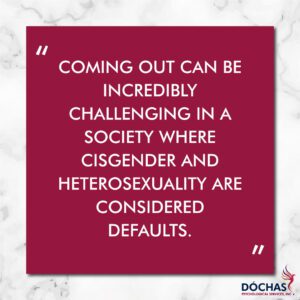Welcome back to our blog! It’s Tatyana here and I want to share some words that will help bring awareness to pride month 2021 and answer some common questions about the LGBTQ+ community. Whether you identify as LGBTQ+, you have a friend or loved one who is part of the community, or you’re not really sure what it means, it’s so important that we all understand the meaning of LGBTQ+ so we can ask for, and show support in the right way.
What being LGBTQ+ means
Being part of the LGBTQ+ community means something different to everyone. That being said, it’s good for us to understand some of the basics about the community to help gain a more appropriate understanding of what being LGBTQ+ means.
Let’s break things down into two categories: gender identity and sexuality. These are two separate, but not entirely disconnected components. As you read this you probably know that LGBTQ+ is an acronym meant to represent every aspect of the community.
Breaking down the LGBTQ+ acronym
The letters LGB stand for lesbian, gay, and bisexual – but these are not the only options available to describe someones sexuality. There are plenty of other words you can use and it’s important to find the one that best fits you.
The only letter in the acronym that represents gender identity is the T, and this stands for transgender. Transgender (or trans) is a sort of umbrella term that’s meant to describe those who identify with a gender that’s different than the one they were assigned at birth. Not every individual with a different gender will identify with the term transgender, though. Remember, there are plenty of options for identification!
The final letter in the acronym stands for queer. This is a term that’s slowly been reclaimed by the LGBTQ+ community, though not everyone in the community wants to reclaim it.
The + on the end of the acronym is meant to represent the myriad of other identities that aren’t listed under lesbian, gay, bisexual, transgender and queer.
Gender dysphoria: What is it and why is it important?
Gender dysphoria is the clinical term used to describe someone who experiences incongruence between their expressed gender and the one they were assigned at birth. Yes, this matches the description of transgender, but it’s important to know that not every transgender individual experiences gender dysphoria. You should also know that gender dysphoria and body dysmorphia are different, and here’s why.
While some transgender individuals may experience body dysmorphia, not all individuals who experience this are transgender. Even so, gender dysphoria is a huge part of the LGBTQ+ community and it’s important to understand on some level. When a person’s personality doesn’t match the gender they were assigned at birth, or their body doesn’t match how they see themselves, it can cause serious harm as they experience dysphoria. The ultimate goal in diagnosing gender dysphoria is to find a way to reduce this dissonance in a way that works best for the person who is experiencing it. This can mean surgery to help their body better align with how they see themselves, hormone therapy to change secondary gender characteristics, or something as simple as voice training. What works best varies from person to person based on their experiences, and it can take time to figure this out.
Coming out: An LGBTQ+ perspective
Coming out is a unique experience that only those in the LGTBQ+ community will ever have to go through. Coming out can be incredibly challenging in a society where cisgender (identifying with the gender you were assigned at birth) and heterosexuality (being attracted to the individuals of the opposite sex) are considered defaults.
If you yourself are thinking about coming out, it’s so important to make sure that you’re safe doing so. There is a lot of fear surrounding rejection, and that fear is valid. If you’re not really sure how or when to come out, click here for a great article that gives some tips on how to prepare to come out!
What to do when someone comes out to you
When someone comes out to you it can be hard to know how to respond. Is there a right way, a proper reaction? Not really. But there are a few things to keep in mind.
First, trust that the person who is coming out to you knows themselves better than you know them. There is no sure fire way to know what’s going on inside someone’s head, so trust that they know themselves better than you do.
There’s nothing bad that comes from wholehearted acceptance. The person who is coming out is telling you who they are in the most pure form possible because they trust you. The best way to show them their trust hasn’t been misplaced is to accept and support them.
This can be difficult for some people. I guarantee that if you have questions about their identity, they’d be happy to answer them or even show you where to get more information. It’s also okay if you need time to process things. The individual coming out has already had time to process what they’re telling you as they explored their identity.
Things we wish we knew: Advice from the LGBTQ+ community
Over time the LGBTQ+ community has become more accepted in the world, but this acceptance hasn’t come without it’s fair share of hardships and struggles. From the original brick thrown at the stonewall riots to the present day, there has been a lot of progress made – and there is plenty more to go! It’s because of everyone who has fought for the LGBTQ+ community that we’ve made it so far. Many of those lives were lost in that fight, and many continue to lose their lives because they’re rejected for being their truest selves.
With all of that being said, I have spent some time gathering advice from those who have already come out, and I’d like to leave you with some words from community members themselves who share what they wish they’d known earlier in their journey:
- It’s okay to experiment with different labels. You don’t have to stick to one if it doesn’t fit, and that label can change over time as you continue to discover yourself.
- People can come out at any age. It can take time to figure yourself out. You might be confident at 14, you might be confident at 30! There’s no shame either way.
- You are not alone in this. It might not feel that way now, but there are so many people out there who will accept you for who you are.
Get the support you deserve
Wherever you stand in the LGBTQ+ community (a member, a loved-one, a supporter) seeking support is important. If you have more questions about what LGBTQ+ means for you or someone else, or you need support in your own journey, send us an email at info@dochaspsych.com or visit our website. We’d love to help you.
About Dochas Psychological
Dochas Psychological Services is a well-established and trusted therapy clinic located in Spruce Grove, Alberta. At Dochas we value the idea that everyone deserves a safe space. Through connection and education, our team works hard to build a trustworthy relationship with each of our clients. It is our goal to create a community for our clients to feel like they belong.
Disclaimer
Information provided through Dochas Psychological Services blogs or vlogs are meant for educational purposes only. They are NOT medical or mental health advice. You can read more about our disclaimer here.











